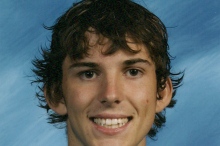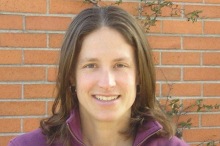Champions of Change Blog
Reaching the Younger Generation
Posted by on October 10, 2012 at 3:51 PM EDT Jordan Paine is being honored as a Champion of Change for her efforts in 4-H and Future Farmers of America.
Jordan Paine is being honored as a Champion of Change for her efforts in 4-H and Future Farmers of America.
Agriculture is my life. I am a proud member of the Southern Valley FFA Chapter, the Nebraska FFA Organization, and the Oxford Junior Feeder 4-H Club. I am very honored to receive this Champions of Change award.
Through 4-H I have been able to serve in many leadership positions. I am currently serving my fourth term as the Oxford Jr. Feeders 4-H Club President and am entering my third term as the Furnas County 4-H Council Secretary. Through improvements made at the county level 4-H, we have seen a large increase in the number of youth involved at the fair. Through my time serving as an officer we have made numerous improvements throughout the fairgrounds. Another privilege 4-H has given me, is to serve on the Nebraska Youth Curriculum Committee, here we review, edit, and help write the Curriculum 4-Her’s use. However, the most rewarding project I have done in 4-H is to start the youth bucket-calf program. The bucket-calf program at our county was dying out, so I decided to buy bucket-calves and raise them for younger 4-Hers who did not have a place for the animals or the knowledge to raise them. The number of calves at fair has increased and the knowledge of younger members has also.
FFA has been my focus throughout high school. As a sophomore I served as the Vice-President of our FFA Chapter and am currently serving my second term as President. Membership and success in our FFA Chapter have been increasing each year. I worked to obtain a goatherd at the school for the FFA Chapter. The goatherd has allowed members to be able to work with livestock, be in charge of the take care of the goats, administer vaccinations, and to learn many other skills. I also worked with a local cooperative to establish the Southern Valley “School Farm.” The school farm is also run by the FFA membership. This project allows students to put the concepts they learn in class into real life. Both are very hands on and depict different aspects of agriculture. Currently, we are raising money to build a greenhouse. We have started the groundwork and have raised more than half of the money needed for the project. These three projects are key in enabling youth to develop the skills they need to succeed in the area of agriculture that interests them.
Now that you know what I do in these two incredible organizations, I think it is important to share how important these organizations are to me. I have been fortunate to grow up around agriculture and to have the opportunity to be a part of FFA and 4-H. My participation in these organizations has provided me countless opportunities and I hope others will get involved and learn about the many benefits of an agricultural education. I am honored to represent both 4-H and FFA.
Jordan Paine is the President of the Southern Valley FFA Chapter and the Oxford Jr. Feeders 4-H Club in Oxford, Nebraska.
Learn more aboutTechnology Education for the Next Generation
Posted by on October 10, 2012 at 3:25 PM EDT Kaydn Ence is being honored as a Champion of Change for his efforts in 4-H and Future Farmers of America.
Kaydn Ence is being honored as a Champion of Change for his efforts in 4-H and Future Farmers of America.
When a large hi-tech company decided not to expand its operations in Saint George, Utah, I was determined to find out why. I learned the decision was largely due in part to the lack of people with technological skills that were needed to fill over 300 jobs. Desiring a positive outcome for future opportunities, I decided to act by working to provide technology education for the next generation of the workforce.
I established 4-H robotics clubs across my county and worked with my local 4-H office, school system, and university to promote the clubs. In 2012, I raised over $2,000 through grants, fundraising, and local sponsorships in order to buy LEGO NXT robotics kits. I also saved money by building the regulation robotics tables using the woodworking skills I learned through 4-H. I believe that if youth get hands-on experience at a young age programming and building autonomous robots, then through these clubs they’ll become interested in technology and more prepared to meet the demands for 21st century careers in computer programming, engineering, and technology.
In just a year after starting the program, I have organized nine robotics clubs with over 100 total members. The youth participating in this robotics club are learning valuable skills that will carry over to future studies and careers in related fields. Local businesses have even pledged their support of the program, providing robotics kits, physical and monetary assistance, and locations for club meetings.
I have organized robotics workshops and summer camps to promote the program. 4-H in Saint George looks forward to continued growth and success in educating the future generation of technology leaders and innovators.
Kaydn Ence is a high school junior from Saint George, Utah.
Learn more aboutConquer the Unthinkable
Posted by on October 10, 2012 at 3:15 PM EDT Kea Norrell Boyd is being honored as a Champion of Change for her efforts in 4-H and Future Farmers of America.
Kea Norrell Boyd is being honored as a Champion of Change for her efforts in 4-H and Future Farmers of America.
Growing up in Detroit, I didn’t become aware of 4-H until attending Michigan State University. I was accustomed to visiting the 4-H Children’s Garden on campus and seeing the green clover but still did not understand the concepts and rich history of 4-H. My experiences taught me that 4-H meant “agriculture,” but I would soon be educated and exposed to the progression of 4-H delivery methods.
Since its inception more than 100 years ago, 4-H has grown to become the nation’s largest youth development organization. 4-H provides out-of-school experiences, in-school enrichment, clubs and camp opportunities for youth to develop leadership skills and explore ways to give back to their communities. 4-H emphasizes the practical application of knowledge or “learning by doing” to develop skills and acquire a sense of responsibility, initiative and self-worth. Adult volunteers play a significant role in 4-H youth development programs and work closely with Extension employees who support the long-term partnerships between land grant universities and the United States Department of Agriculture (USDA). Many people (me included) are familiar with the agricultural aspects of 4-H and are surprised to hear how 4-H programming has evolved over the years to be relevant in rural and urban settings.
In 2005, with increasingly challenging conditions in Detroit, Michigan State University Extension and Michigan 4-H answered the call of duty and formed the Wayne County 4-H Mentoring Program. I was the first staff member hired to coordinate a 4-H mentoring program that works to decrease delinquency and truancy and increase academics of youth ages 10 to 17. Since 2006, the mentoring program has grown significantly and currently has six staff members and services more than 300 youth.
In expanding the Wayne County 4-H Mentoring Program I realized that it is great to offer caring adult mentors to at-risk youth, but that only addresses one of many challenges. I began to notice that the young people in the mentoring program also needed tutoring, Individual Education Plans, individual/family counseling, anger management, housing referrals, food, clothing and assistance with utilities. I proposed to offer a 4-H mentoring program that went above and beyond the mentoring relationship but also focused on the whole family and the community. The Wayne County 4-H Mentoring Program now conducts home visits in which trained staff members assist participating families in identifying community resources to empower the whole unit (child, family, neighborhood and community).
To truly give young people growing up in high-risk environments a chance to succeed, we must find ways to support, intervene and redirect youth who have unenviable circumstances. I have worked extremely hard so that urban Detroit youth (within and outside of the Wayne County 4-H Mentoring Program) have comparable experiences to their suburban counterparts. Wayne County 4-H Mentoring Program youth participate in service learning projects, precollege experiences such as Exploration Days, which takes place on the campus of Michigan State University and 4-H Mentoring Weekend at the Kettunen Center (a full-service retreat facility on a lake in mid-Michigan). I believe that exposure and education are the keys to expanding the mindsets of underserved youth. If you are unfamiliar with various accomplishments (such as obtaining a college degree or securing a successful career) or don’t see people who look like you that have attained them, it is more difficult to envision yourself in that role. The Wayne County 4-H Mentoring Program provides youth with the opportunity to “learn by doing” so that they not only envision themselves in successful roles but also master skills, which encourage the ability to conquer the unthinkable.
In June of this year, The Wayne County 4-H Mentoring Program celebrated eight graduating high school seniors. The majority of them entered the mentoring program when they were in middle school. Out of the eight seniors, three received full scholarships to Big Ten Universities, two were accepted to other four-year universities and the remaining three are attending community college or working. It was a very proud moment to present certificates to young people I have watched learn and grow and have assisted in accomplishing goals that some felt were unobtainable. I sometimes sit and wonder what their lives would have been like if they hadn’t had supportive adult mentors, skill development opportunities and life changing experiences. But then I snap out of it and remember that they did have the Wayne County 4-H Mentoring Program as a comprehensive support system and are excelling because of it.
Please consider contacting a local 4-H club or mentoring program if you would like to give back to your community or touch the life of a young person. You may not always see immediate results, but the long-term effects are tremendous. Mentoring is like planting seeds. You may spend time and effort with young people now but the reward may come later with the harvest. Adults often forget what they did over the years to support a young person, but the young person never forgets those who took a special interest in them. Remember to thank individuals who influenced your life. It makes a huge impact to hear that “you made a difference in my life and I appreciate you.”
Kea Norrell Boyd is an educator for the Wayne County 4-H Mentoring Program, a part of the Children & Youth Institute at Michigan State University Extension.
Learn more aboutService versus Charity
Posted by on October 10, 2012 at 2:01 PM EDT Neeta Patel is being honored as a Champion of Change for her efforts in 4-H and Future Farmers of America.
Neeta Patel is being honored as a Champion of Change for her efforts in 4-H and Future Farmers of America.
I don’t recall ever actively deciding to get involved in community service. Serving others just came naturally, and once I discovered the power of service it became contagious. As Mahatma Gandhi once said, “The best way to lose yourself is to lose yourself in the service of others.” Throughout high school, even when it was difficult to find time to finish classwork, I managed to make time for a weekly dose of community service. Subconsciously, putting myself in the service of others pushed away the petty problems and worries of my own life, and the values and characteristics that define me were able to take center stage. As I expanded my experiences in community service beyond high school, I learned that effective service takes on many forms.
I was first exposed to the most basic form of community service, charity, through my local 4-H program. Many people argue that charity is not an effective form of service, because it is not an inherently sustainable program within a community. Charity usually originates from outside sources that can come and go as they please. However, my involvement in 4-H taught me otherwise. Through the Together We Sew 4-H club, I sewed blankets for animals at the local shelter, held food and clothing drives, collected donations to ship to troops overseas, and donated homemade cookies during the holidays to a young mothers’ program home. Small projects like these are manageable for the average citizen and add a personal touch to the task at hand by fostering one-on-one interactions between the donor and the donee. More importantly, they address immediate needs within a community that may not be recognized and acted upon otherwise. Although charity functions on a small scale, volunteer work at this level can prove to be extremely satisfying and successful.
As I grew older and took on the role of a teen volunteer within my 4-H community, I became an AmeriCorps member. AmeriCorps enabled me to really harness the power of service and expose others to the opportunities service can provide. During my time as an AmeriCorps member, I resurrected the 4-H Teen Council to promote our mission of leadership to a wider audience. I also helped in youth programming, such as 4-H Club Officer Trainings, to expose younger kids to the ideas of service and citizenship. The projects I executed as an AmeriCorps member, such as a student-directed informational video on the ideal of citizenship, addressed the issue of getting today’s youth more involved in service and more aware of their responsibility as citizens of this nation.
My intense community service background from 4-H inspired me to take a gap year after I graduated high school. Through the Princeton Bridge Year Program, I deferred my enrollment at Princeton University for a year and travelled to Ghana, West Africa where I spent nine months immersed in a foreign culture. While in Ghana, I volunteered at various destinations, including a middle school in a rural village in the Ashanti Region. I taught math and computer classes to the Form One (6th grade) students in my assigned school. Teaching computer class was especially challenging because the school lacked the proper resources to teach the children about modern technology. Over the course of my four months in the village, I raised over $2000 from my high school and 4-H communities to build the school a computer lab. With help from family and friends, I was able to purchase proper electricity and 12 computer desktop stations for my school. Now, future students will be able to learn about computers practically, instead of the old theoretical approach of drawing Microsoft Word documents on the blackboard. The computer project in Ghana was one of my first experiences in larger-scale service projects versus charity. Although the project was more difficult to execute from start to finish and required a huge investment of time, it addressed a deeper issue than charity normally does. The computer project was sustainable and strengthened the community at the core, by furthering the education of their youth. I was able to interact with my school and create a program there that would ensure the protection and success of the computer lab long after I left. This type of project was just as effective as the charity I began with in 4-H, but only addressed a different level of issues.
I am humbled to be selected as a Champion of Change honoree, and I want to use this moment as an opportunity to spread the word about the transformative power of service. Community service takes on many forms, as my story illustrates, and there is something out there to fit everyone’s availability. Whether you want to become involved in a short-term charity goal, or a long-term social project, challenge yourself to take that next step towards action!
Neeta Patel is a first-year student at Princeton University.
Learn more aboutThe Value of Agricultural Education
Posted by on October 10, 2012 at 1:42 PM EDT Jacob Dickey is being honored as a Champion of Change for his efforts in 4-H and Future Farmers of America.
Jacob Dickey is being honored as a Champion of Change for his efforts in 4-H and Future Farmers of America.
Growing up, my family always stressed the importance and value of a quality education. Before my grandfather passed away, I often remember him asking how school was going, what I was learning, and how I would apply it to my life. I could always answer the first two questions, but the last one never failed to make me ponder. After a swift chuckle, each time he reminded me to pursue rigorous coursework in Math, Science and English. However, I always remember him stressing to take vocational courses. I never fully understood the importance of his words until I began to pursue agricultural education and became a member of FFA.
Agricultural Education has done more for me than my core academic subjects could have ever done. While I appreciate the knowledge I gained from my calculus and physics classes, none of these courses developed my skills in premier leadership, personal growth and career success. These three skills are the foundation of all agricultural education programs in the United States.
Throughout my years in agriculture education, I have learned about various topics in agriculture- from crop sciences to animal production to business management and more. I have also cultivated the ability to stand up for something I felt passionate about and learned to share my views in front of thousands of people. I developed crucial skills in networking, problem solving, public speaking, leadership and organization. My agricultural education has provided me with an abundance of experiences, from visiting with high school students who have found passion and purpose in agriculture, to traveling to Europe and observing the differences in education and agriculture.
I am forever grateful that I took my grandfather’s wisdom to heart. Each year, FFA and agricultural education give over 520,000 of my fellow students the opportunity to define their future by planting individual seeds of leadership, passion and opportunity. It gives students the chance to apply what they learned into real world situations, and inspires students to go above and beyond in ways many of them have never dreamed. The one thing I will always appreciate the most about agricultural education is the value it places on the world and making a positive difference in the lives of others.
Finding unique and innovative ways to bring agricultural students together with civic organizations was something I felt immensely passionate about. In order to foster growth amongst the members I served, I knew it was important to get students excited to make a difference in the lives of others while inspiring themselves through the process. With the connections I made myself as an FFA member, I brought together businesses and civic organizations in my state, including the Coca Cola Bottlers Association, the Illinois Special Olympics, and numerous local groups and organizations. I started a service campaign dedicated to the Special Olympics, revolving around the last three words of the FFA motto, “Living to Serve.” Once just an idea, the concept turned into a full blown campaign that reached over one-thousand students in schools across Central Illinois. Personally, whenever I think of education, life and serving others, I always think of the quote “go the extra mile; it’s never crowded.”
Reflecting back, I realize that giving the students the chance to make a difference through interacting with those in the community is more powerful than any classroom curriculum. That’s why I believe in the FFA and its ability to shape young teens into powerful leaders of the upcoming generations. The FFA leaves students with a sturdy foundation to go out and achieve dreams, accomplish goals and change the world. The FFA gives students the chance to believe in something larger than their own lives. The FFA inspires students to step up in their schools, their communities and their world, striving for a better tomorrow. The FFA makes a positive difference in the lives of others through premier leadership, personal growth, and career success.
To the FFA members out there reading this, remember at the end of the day that you extend your own life by contributing to something that will outlast you. That's why the FFA is so special. And that's why, when you hang up that blue jacket for the final time, you should continue to love it, to give to it, and to make sure that the opportunities you have been given-the education you have been given- is maintained. You should treat the organization you grew in like a jewel in your life and in your heart because of what it did for you. Regardless of where we go in life after wearing the blue and gold, those of us who wore that corduroy jacket have been bonded by agriculture, inspired to make a difference, and cultivated into the next generation of leaders. We are now, and will always be, forever blue.
Jacob E. Dickey is a sophomore studying Agricultural Education at the University of Illinois at Urbana-Champaign.
Learn more aboutLearning the Challenges and Successes of Farming
Posted by on October 10, 2012 at 1:19 PM EDT Ridge Howell is being honored as a Champion of Change for her efforts in 4-H and Future Farmers of America.
Ridge Howell is being honored as a Champion of Change for her efforts in 4-H and Future Farmers of America.
What a fantastic surprise to be chosen as a Champion of Change and to represent the Philadelphia FFA and WB Saul high school of Agricultural Sciences in Philadelphia, PA. Not an obvious location for one of the nation’s largest FFA chapters, Philadelphia is home to fourteen agricultural educators making strides in horticulture, animal science, natural resource management, food science, and agricultural production. As one of the head FFA advisors, I am responsible for trip coordination, Career Development Events, Leadership Conferences, and FFA activities throughout the high school. Saul boasts four Pennsylvania State FFA officers and currently one National FFA candidate. Needless to say, Saul has the best FFA chapter tee shirts around!
I teach Advanced Placement Environmental Science, AgroEcoogy, and Urban Gardening. With Saul’s agricultural uniqueness I have had the privilege to help found, coordinate, and facilitate the Henry Got Crops! Community Supported Agricultural Partnership between Saul High School, Weavers Way Cooperative, and Fairmount Park. This fantastic CSA allows students to have a true hands on working perspective of agricultural vegetable production, compost production, and currently, a native berry/fruit tree nursery. Henry Got Crops! serves as an example of true community partnership that supports students, their learning and their own personal growth. Appropriately named by an AgroEcology student for Saul’s location on Henry Avenue, Henry Got Crops! demonstrates the challenges and successes of farming without chemicals and enables students to see the value in sustainable crop production.
At Saul and within the Philadelphia FFA Chapter, I am also responsible for the coordination of the Outward Bound programming, the World Food Prize Programming, the Students Run Philly Style Marathon Training Program, and the University of Pennsylvania’s Engineers without Borders programming. I also co-facilitate the Mentally Gifted Program and work with a wonderful scientist through the Scientists as Teachers - Teachers as Scientists program. Most importantly, ecology speaking, I have facilitated the entire school’s recycling efforts. Through contamination, inappropriate receptacles and questionable collection methods, Saul can now safely say that it is recycling to the best of its ability and that the amount of recyclable waste entering landfills has been dramatically diminished.
Never did I think that Mr. Smokers faith in a little organization called It’s Our World Too or Mom’s relentless work in the small “truck” garden would land me a space as a Champion of Change. I hope that I am able to empower my students in such a manner and to create more agents of change within Philadelphia communities.
Jessica Naugle McAtamney is an agricultural educator at W.B. Saul High School of Agricultural Sciences in Philadelphia, Pennsylvania.
Learn more about
- &lsaquo previous
- …
- 82
- 83
- 84
- 85
- 86
- 87
- 88
- 89
- 90
- …
- next &rsaquo
White House Blogs
- The White House Blog
- Middle Class Task Force
- Council of Economic Advisers
- Council on Environmental Quality
- Council on Women and Girls
- Office of Intergovernmental Affairs
- Office of Management and Budget
- Office of Public Engagement
- Office of Science & Tech Policy
- Office of Urban Affairs
- Open Government
- Faith and Neighborhood Partnerships
- Social Innovation and Civic Participation
- US Trade Representative
- Office National Drug Control Policy
categories
- AIDS Policy
- Alaska
- Blueprint for an America Built to Last
- Budget
- Civil Rights
- Defense
- Disabilities
- Economy
- Education
- Energy and Environment
- Equal Pay
- Ethics
- Faith Based
- Fiscal Responsibility
- Foreign Policy
- Grab Bag
- Health Care
- Homeland Security
- Immigration
- Innovation Fellows
- Inside the White House
- Middle Class Security
- Open Government
- Poverty
- Rural
- Seniors and Social Security
- Service
- Social Innovation
- State of the Union
- Taxes
- Technology
- Urban Policy
- Veterans
- Violence Prevention
- White House Internships
- Women
- Working Families
- Additional Issues

